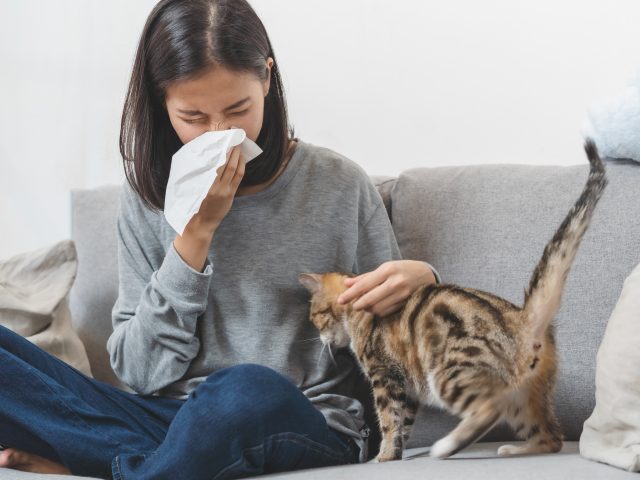How Allergies May Affect Your Asthma

If you’re like many people with asthma, you also have allergies. In fact, you may have what is referred to as allergic asthma. Of the 25 million people with asthma in the U.S., about 60% have asthma caused by allergies.
Here are answers to some of the most common questions about the connection between asthma and allergies.
Is all asthma triggered by allergies?
Allergic asthma is the most common type of asthma but asthma can be triggered by a variety of other factors, including exercise, cold air, gastroesophageal reflux (GERD), infections or stress. Many people find their asthma is triggered by more than one thing.
Are you more at risk of developing asthma if you have allergies?
Having seasonal or other types of allergies increases your risk of developing asthma, but not everyone who has allergies has asthma. And not everyone who has asthma has allergies. The most common allergens that induce allergic asthma include pollen, dander, mold spores and dust mites.
Why do allergies often go hand in hand with asthma?
Substances that cause an allergic reaction can also trigger asthma symptoms. This is because when you are exposed to an allergen, your immune system reacts to it like it’s an unwanted invader and produces antibodies called immunoglobulin E (IgE) to protect you from danger. The next time you encounter the allergen, IgE antibodies signal your body to release chemicals designed to protect you from the allergen.
One of these substances is histamine, which can affect the eyes, nose, throat, lungs and skin. When it affects the lungs, it can trigger asthma symptoms like coughing, wheezing, shortness of breath and chest tightness. You may also experience allergy-related symptoms like nasal congestion, a runny nose, sneezing, itchy eyes or a rash.
How is allergy-induced asthma treated?
Symptoms of allergic asthma are the same as any other type of asthma and are treated the same way. One of the best ways to prevent allergic asthma from flaring up is to avoid the allergen if you know what it is. You may be prescribed long-term asthma control medications which are taken daily. You’ll also be given a rescue inhaler for rapid symptom relief in case you need it during an asthma attack. It may also be recommended that you take allergy medications to keep allergic reactions under control.
Other treatments that may help allergy-induced asthma (especially if symptoms are more severe) include:
- Allergy shots: Getting regular injections of a tiny amount of the allergens that trigger your symptoms can gradually reduce your immune system response to those triggers. As your allergic reaction diminishes, it can also reduce asthma symptoms worsened by the allergic reaction.
- Leukotriene modifier: This medication (Singulair) helps control the immune system chemicals that are released during an allergic reaction and can treat both asthma and allergic rhinitis.
- Anti-IgE therapy: By interfering with the IgE in the body, this medication helps prevent the release of histamine and other chemicals that cause an allergic reaction and trigger asthma symptoms. It is typically only used in people with severe allergic asthma.
Copyright 2022-2023 © Baldwin
Publishing, Inc..
Health eCooks™ is a designated
trademark of Baldwin Publishing, Inc. Any duplication or distribution of the information contained herein without
the express approval of Baldwin Publishing, Inc. is strictly prohibited.